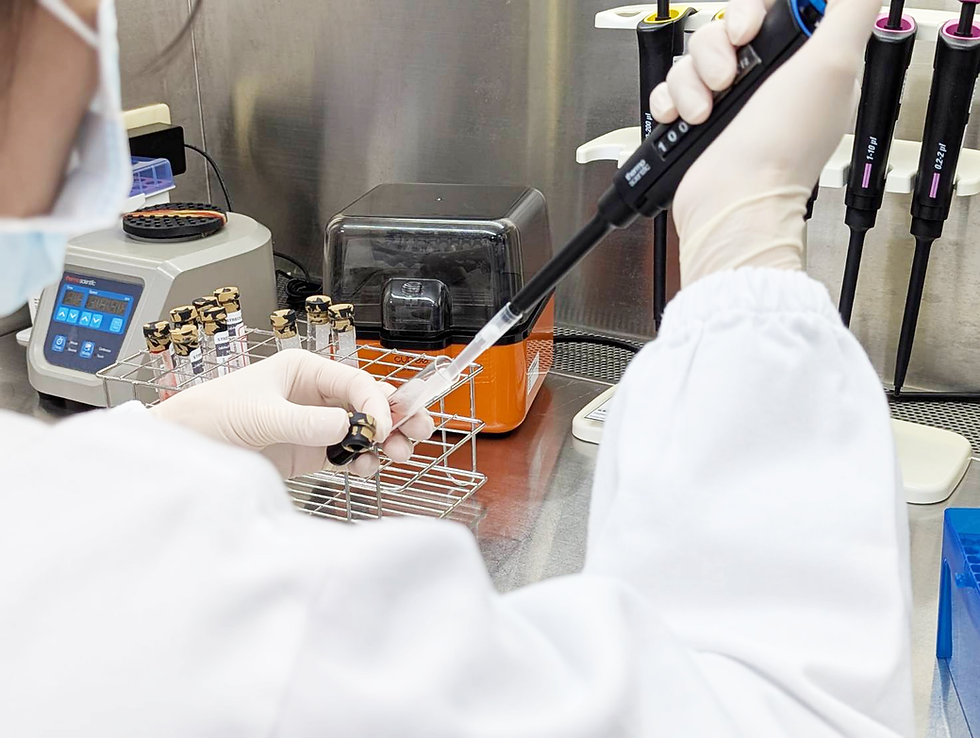Patents & Global Certifications: EG BioMed’s DNA Methylation Blood Test Advances Early Cancer Detection
- May 16, 2025
- 3 min read
Updated: May 22, 2025

EG BioMed specializes in developing innovative blood-based cancer diagnostics centered on DNA methylation technology. The company has been awarded multiple patents both in the U.S. and internationally, including recent patents for early detection of pancreatic cancer (US 12,258,636 B2) and breast cancer (US 12,203,140 B2). These advancements are supported by globally recognized quality certifications—CLIA Laboratory Developed Tests (LDTs), ISO 15189, and ISO 13485—ensuring high accuracy, consistency, and clinical reliability across our testing platform.

In February 2025, EG BioMed’s U.S. laboratory earned CLIA certification and LDT authorization for its pancreatic cancer blood test, marking a major milestone in the company's journey to deliver high-quality, non-invasive cancer detection services. The test has demonstrated excellent performance in clinical validation—offering high accuracy, sensitivity, and specificity for early pancreatic cancer detection.

Only 8 mL of Blood for Early Cancer Screening
EG BioMed’s test detects abnormal methylation in circulating tumor DNA (ctDNA)—small fragments of DNA released into the bloodstream by cancer cells. These fragments often exhibit abnormal methylation in tumor suppressor genes, which silences gene expression and serves as a biomarker for early-stage cancer.

The test requires only 8 mL of blood. By integrating methylation biomarkers with automated qPCR analysis, we provide a comprehensive report within one week. This test is ideal for individuals at higher risk—including those with long-standing diabetes, a family history of cancer, or those undergoing recurrence surveillance after treatment. It also serves as a valuable complement to imaging and invasive procedures, offering clinicians an innovative, non-invasive diagnostic option.
EG BioMed Expands Cancer Detection to Pancreatic, Breast, and Colorectal Cancers
EG BioMed’s research team has successfully extended its proprietary methylation-based detection technology to a range of cancers, including pancreatic, breast, and colorectal cancer.
Initial findings were presented at the 2024 American Society of Clinical Oncology (ASCO) Annual Meeting: Lin RK. Early prediction of pancreatic cancer through detection of methylated circulating DNA in blood. J Clin Oncol. 2024;42(16_suppl):e16353. doi:10.1200/JCO.2024.42.16_suppl.e16353.
Updated results will be shared at the upcoming 2025 Annual Meeting of the American Association for Cancer Research (AACR): Lin RK, Hsieh YY, Shen HT, Chen HA, Chan TS. Early detection of pancreatic cancer using methylated circulating cell-free DNA of promoter of ZFP30 and ZNF781 genes.

Pancreatic Cancer Blood Test
Pancreatic cancer (PC) is often diagnosed at advanced stages, leading to limited treatment options and poor survival rates. Current biomarkers, such as CA19-9, have high false-positive rates. Aberrant DNA methylation, a stable and early epigenetic event in tumorigenesis, has emerged as a promising biomarker for early detection and disease monitoring. This study presents a novel blood test analyzing methylated cell-free DNA (mcfDNA) on promoters of ZFP30 and ZNF781 genes for the early detection of pancreatic cancer. Functional assays were also performed to explore the tumor-suppressive roles of ZFP30 and ZNF781 in pancreatic cancer cell lines.

Breast Cancer Blood Test
Breast cancer remains a leading cause of cancer-related deaths, with 20-30% of early-stage cases progressing to metastasis. Current biomarkers, such as CA15-3 and CEA, are limited in detecting metastases, necessitating improved diagnostic tools. This study develops and validates a blood test using methylated GCM2 and TMEM240 for monitoring breast cancer progression, treatment response, tumor burden, and clinical parameters.

Colorectal Cancer Blood Test
Carcinoembryonic antigen (CEA) is currently the most widely utilized biomarker for monitoring colorectal cancer (CRC) progression and treatment. With a sensitivity of approximately 80% and specificity of 70% at a level of 5 μg/L, CEA has demonstrated clinical utility in many cases. However, 20-30% of CRC patients fail to benefit from CEA monitoring due to its limited dynamic range and clinical irrelevance in specific cases, underscoring the urgent need for more accurate and reliable biomarkers. Previous studies have identified TMEM240 gene hypermethylation as a promising biomarker for CRC detection in both Asian and Western CRC patient cohorts.
Driving Early Cancer Detection to Improve Patient Survival
Early detection is key to improving treatment outcomes and survival rates. EG BioMed is dedicated to providing accurate, accessible DNA methylation-based tests to support timely cancer diagnosis.We welcome collaboration with healthcare providers, researchers, and industry partners to expand the reach of early detection and make precision medicine a reality for patients worldwide.
We are actively forming strategic partnerships with YD Biopharm and several institutions across the United States—from top-tier academic centers like the University of Washington and leading cancer research institutes to trusted community clinics and primary care providers such as Health Direct Primary Care Clinic and Professional Medical Corporation.
These collaborations support our ongoing clinical trials and validation efforts for pancreatic and breast cancer detection. They also strengthen our applications for FDA De Novo classification and Breakthrough Device designation, helping bring innovative diagnostics to clinical use faster and benefiting patients in need.
To learn more about EG BioMed, please visit:
U.S. site: https://www.eg-biomed-us.com
Taiwan site: https://eg-bio.com/
Contact Us:
Ruokai Lin ruokailin@eg-bio.com



Comments